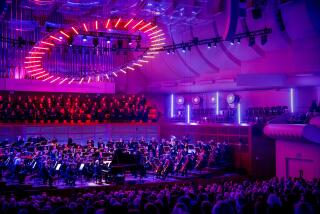Almost mystical experience
SANTA BARBARA -- The title of Olivier Messiaenâs âVingt Regards sur lâEnfant-Jesusâ does not translate easily into English. A common version is âTwenty Gazes Upon the Child Jesus.â But âregardsâ also implies âaspectsâ or âcontemplations.â One translator, apparently feeling that any suggestion of corporeality would be misleading, simply supplied ellipses for âregards.â After all, Messiaenâs mystical music invites out-of-body experiences.
That was certainly the effect of Christopher Taylorâs spellbinding performance of the work Wednesday night in a new, intimate space at the Music Academy of the West. The evening began when an apparently mild-mannered pianist -- balding, conservatively dressed in tan jacket and dark pants -- walked onstage in Hahn Hall looking like a professor about to begin a lecture. (Taylor is, in fact, on the faculty of the University of Wisconsin, Madison.) But after two hours at the keyboard, he had become a wild man in the thrall of a great vision, seemingly possessed of superhuman powers. Clearly forces beyond the normal were at play.
First, though, a quick word about the hall. Hahn, which opened last month, is the new centerpiece of the West Coastâs elite summer music academy, hidden away in a plush neighborhood of Montecito, a block from a glorious coastline. The interior design is on the busy side, but with 350 seats, it is perfect for chamber music and recitals. Acoustics are unobtrusive; nothing gets between music and the ear. Besides serving as a home for students, faculty and visiting artists at the academyâs summer festival, Hahn will also become available in the fall for local chamber groups and UC Santa Barbara concerts.
But fine as Hahn is, Taylor all but made the hall disappear. Messiaenâs âregardsâ are the gazes (or whatever) of a devout Roman Catholic composer at different aspects of his church. He has a theme of slightly shifting, ever shimmering chords for God and a sinuous chromatic melody for what he calls âTheme of the Star and Cross.â He turns his attention to the Virgin, the Father and the Son, but also to silence and the sword, to time and creation, and most of all to love.
Written in Paris between March and September 1944, âVingt Regardsâ is extraordinary music of extraordinary times, during which the Allies invaded France (D-day was that June), and Messiaenâs score is not only a profound contemplation of existence but also a huge outpouring of gratitude. He was also newly in love.
Pianistically, âVingt Regardsâ is one of the literatureâs great challenges. As with the other few who dare tackle it (Peter Serkin and Pierre-Laurent Aimard are among the most notable), Taylor has a massive technique. He is a percussive pianist able to get his Steinway to sound as though it were made of metal, as though it could ring like large bells and generate a rainbow of color.
Rhythm is one of his strong points. Often he was tense as a tiger ready to pounce. But in quiet passages, he lost himself in sound, hunched over the keys as if using psychic powers to will a note to resonate longer than physically possible.
Another trick Taylor has up his sleeve is that he has found a way to make the piano sound as if it could levitate. Messiaen would not be Messiaen if bells did not peal in his music to signal the opening up of the heavens and if birds did not sing. But Taylor somehow created the illusion that bird song came from various places around the hall and that some of the bells came from beyond the shoreline.
âVingt Regardsâ ends with a 15-minute paean to love. To love of God and of existence. But also to love of love. Taylor by this point was sopping wet and looked spent. He was breathing heavily and loudly. Music that transcends physicality became all about physicality. Like an athlete going beyond his capacity, like an actor transforming himself into another being, Taylor disappeared deeper and deeper into Messiaenâs louder and louder tintinnabulations.
When it was over, he became himself again and walked offstage just as if he had delivered a lecture, as if revelation were all in a dayâs work. It was a great performance.
More to Read
The biggest entertainment stories
Get our big stories about Hollywood, film, television, music, arts, culture and more right in your inbox as soon as they publish.
You may occasionally receive promotional content from the Los Angeles Times.











